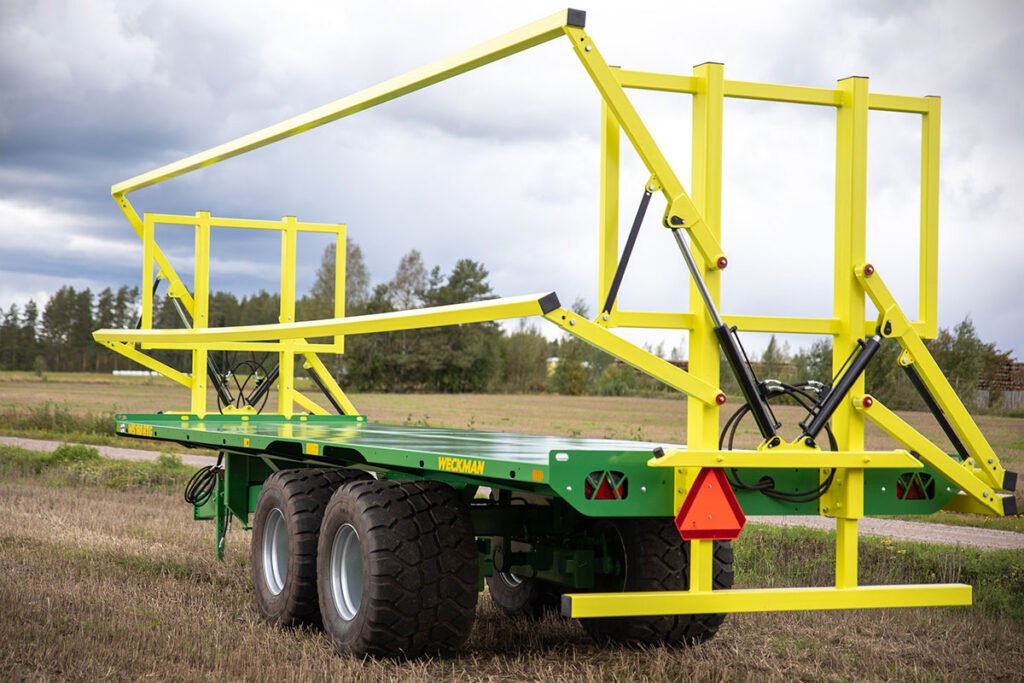The manufacturing process of Weckman’s new trailer range has been updated from design to procurement, production and delivery. A larger share of the materials used to make the trailers are produced with environmentally friendly methods. After the launch of the new range, the CO2 emissions caused by the production of steel for the trailers have decreased by 1.5 million kg per year.
“The changes in the design and manufacturing of the trailers have reduced emissions caused by production, the use of raw materials and the environmental burden arising during the use. With the changes, we can meet the requirements set by EU directives for the design and safety of agricultural machines*,” explains Janne Hiironen, Weckman’s trailer line manager.
More ecological design and use of trailers
The amount of steel used to make the new trailers has been minimised and the trailers are tested to make sure that they meet all the requirements set for trailers in their capacity class. “We have designed the trailer beds and frames so that the amount of individual steel parts could be reduced by 40%. This change helps make the entire production chain more efficient and improves eco-friendliness by decreasing the energy use of the machines used for production,” explains Hiironen.
Trailer users were also borne in mind in the redesign of the trailers. “Trailers in a particular capacity class can now carry heavier loads, allowing reductions of up to 20% in the required load runs, which frees that time for other operations. Each extra per cent added to the weight of the load reduces fuel consumption and CO2 emissions by one per cent,” notes Hiironen.
“On average, trailers are 10% lighter, which reduces fuel consumption by the tractor that pulls them by 5%. Each 1,000-litre reduction in fuel consumption decreases CO2 emissions by 3,000 kg,” he says.
Sustainable trailer production reduces the carbon footprint of logistics
The new trailers are made with 99% robot welding methods, which improves the repeatability of welding, speeds up the manufacturing process, reduces waste uses less energy. Manual welding is used very little.
The environmental burden caused by logistics has also been reduced. In all five capacity classes, the trailers have almost the same parts, the number of part items has been halved and the trailers are lighter.
“We can produce more trailers with less raw material: we can order steel as larger loads, thereby reducing the number of deliveries and emissions caused by transport. The use of same parts for all trailers means less demand for spare parts and maintenance and makes our services more efficient,” says Hiironen.
Cutting the number of parts by half and switching to robotic welding made manufacturing operations more efficient and streamlined internal logistics. “Processing and transferring the parts required for production take less time and consume less chemicals. This helps reduce the carbon footprint of our internal logistics and shorten our turnover times: we can now produce four trailers in a time that it used to take us to make one,” explains Hiironen.
Sustainable trailer production in Vierumäki
Thanks to robotic welding, each welding seam is easily traceable as the system records all seam data on a computer. “Our raw materials are also fully raceable.. Our suppliers deliver material on consistent quality and we hardly ever get complaints. However, if there is a complaint, we can easily investigate the cause and respond to the situation,” says Hiironen.
New technology will be introduced to the trailer surface treatment process during 2022. The new process will be significantly more environmentally friendly, starting from materials. However, quality will never be compromised. “We will provide more information on this next year; at the moment, we are testing the durability of the new paints,” explains Hiironen.
“In the future, we will also offer top-quality Weckman products made from recycled materials. In 2030, all our trailers will be made from fossil-free steel,” he adds.
Even after all these changes, the principle of the Weckman trailer production remains the same. “The quality of products has always been ‘the best money can buy’ and we will never compromise on this. Weckman product will last you for decades without needing to repaired or replaced. That’s true eco-friendliness,” says Hiironen.
*SFS-EN 1853:2017 + AC:2019 and SFS-EN ISO 12100
This is how the new Weckman trailers help protect the environment:
A 10% lighter trailer → a 5% reduction in fuel consumption
20% fewer load runs, thanks to the larger loads
40% fewer steel parts required for the manufacture of the trailers
A 1.5 million kg reduction in CO2 emissions per year from steel production


